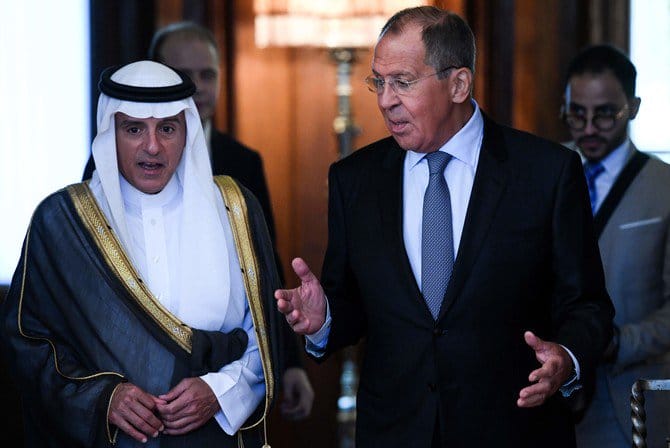Russian Foreign Minister Sergey Lavrov has said that opposition control of Idlib Province in the northwest Syria is a “festering abscess needs to be liquidated“.
Continuing the campaign for a pro-Assad offensive on the last major opposition area in the country, Lavrov hosted Saudi counterpart Adel bin Ahmed al-Jubeir in Moscow. He then set out the pretext for breaking the “de-escalation zone” of Idlib, northern Hama, and western Aleppo Provinces, proclaimed by Russia, Turkey, and Iran last year:
This is the last hotbed of terrorists who are trying to speculate on the region’s status as a de-escalation zone, who are trying to hold the civilian population hostage as human shields and bend to their will those armed groups ready to engage in dialogue with the government.
So from all points of view, this festering abscess needs to be liquidated.
Jubeir was non-committal. He said, “We will…engage with our brothers in Russia in supporting the political process”, but also assured, “[We will] cooperate with the Syrian opposition to close ranks regarding the future of Syria.”
Rather than support military action, Al-Jubeir said Saudi Arabia had highlighted the importance of implementing UN Security Council resolutions calling for a ceasefire and a political settlement which “preserves Syria’s territorial integrity, security, and stability as well as the safety of citizens regardless of their religion or race”.
Russia has been trying for weeks to get political acceptance of the assault, following the pro-Assad captures of East Ghouta near Damascus and of almost all opposition territory in southern Syria this spring and summer.
But Moscow has struggled to win over Turkey, whose military has been alongside rebels in the area since intervention in August 2016 to push back the Islamic State and then to take most of the Kurdish canton of Afrin this spring.
In two meetings earlier this month, Lavrov told Turkish Foreign Minister Mevlüt Çavuşoğlu that “extremists” must be erased from Idlib; however, Çavuşoğlu held out against the conventional and chemical attacks that vanquished East Ghouta and southern Syria.
Turkey, which hosts more than 3 million Syrian refugees, is concerned that many of Idlib’s residents — estimated at up to 3 million by Çavuşoğlu — will be displaced and try to cross the border. Turkish intelligence puts the likely number of those fleeing at 250,000.
After a phone call with Russian counterpart Sergey Shoygu on Thursday, Turkish Defense Minister Hulusi Akar said, “We are…striving to maintain the security of some 4 million locals, to continue relief efforts and to stop attacks to keep the ceasefire in Idlib.”
See Syria Daily, August 25: Turkey Repeats to Russia — No Pro-Assad Assault on Idlib
Foreign Minister Mohammad Javad Zarif of Iran, the other essential ally of the Assad regime, met Çavuşoğlu and Turkish President Mevlüt Çavuşoğlu on Wednesday.
Just finished fruitful consultations with Turkish FM @mevlutcavusoglu, and President @rt_erdogan on bilateral relations and regional cooperation in the face of malign US behavior. Off to #Pakistan tomorrow to meet with new leadership. Our neighbors our priority. pic.twitter.com/ObGE1gPefn
— Javad Zarif (@JZarif) August 29, 2018
Russia’s Disinformation and Military Moves
Checked by the Turks, Russia has shifted to an approach trying to convince rebel factions to “reconcile” — i.e., capitulate — and separate themselves from the “terrorists” of the jihadist bloc Hay’at Tahrir al-Sham.
Moscow has continued the pressure with movement of military forces, alongside the deployment of the Assad regime and pro-Assad foreign militia. This week it announced the positioning of 10 warships, equipped with missiles, in the Mediterranean.
Russia also continued its disinformation that rebels and White Helmets rescuers are planning a “false flag” chemical attack. The Russian Ambassador in Washington, Anatoly Antonov, said he had given “intelligence” to the US special enovy to Syria, James Jeffrey, and Acting Assistant Secretary of State David Satterfield on Monday.
The Russian Embassy to the US puts out a statement joining in with the false flag chemical weapon attack propaganda Russia has been pushing for the last week https://t.co/0q4M09VdYH pic.twitter.com/zbFTZDG9t0
— Eliot Higgins (@EliotHiggins) August 30, 2018
The Russian tactic was used in East Ghouta to cover for the Assad regime’s use of chemical weapons to force capitulation. Even if the regime does not carry out the attack, the implied threat could force rebels to surrender to avoid the strikes.
See Syria Daily, August 26: Russia Pushes Disinfo Over Chemical Attacks on Idlib
Foreign Ministry spokeswoman Maria Zakharova issued the diversionary statement that it is “the West” — and the Assad regime — threatening “potential aggression” through “the use of toxic substances and staged chemical attacks with the goal of making false accusations against the Syrian government and the military related to alleged chemical attacks”.
As Russia moved its warships into the Mediterranean, Zakharova said, “[The US] may build up missile capabilities for strikes on Syria just over 24 hours.”

